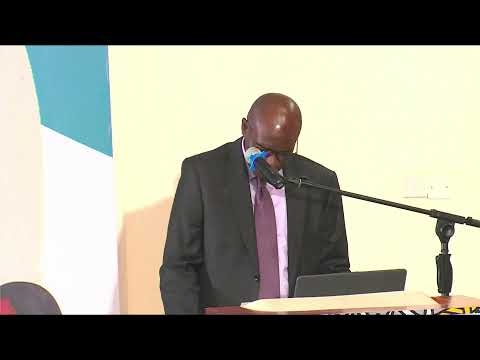

Esethu Dywili says his lucrative accountancy work has given him the chance to change his family's life.
The 31-year-old has spent a number of years working in South Africa's fast-growing outsourced financial services sector.
An outsourced services company is one, often based in the developing world, which does work for other businesses, typically big firms in Europe and North America.
Examples include call-centres in the Philippines, IT operations in India, and South African companies that offer auditing and other finance work.
Back in 2022, Mr Dywili had earned enough money to build a new house for his parents and siblings. They live in a village in the country's Eastern Cape province, an 11-hour drive from Johannesburg, where Mr Dywili now resides.
"When you work for a firm that earns its revenue in US dollars or British pounds, they are able to pay competitive salaries that perhaps you would not get working for a local South African company," says Mr Dywili, who has a degree in commerce and accounting.
Carving out a career in South Africa's booming outsourced services industry is not something to be taken lightly when you consider the country's unemployment rate is around 33%, one of the highest in the world.
South Africa's growing popularity as an outsourcing destination has been fueled by a number of factors. Firms in countries such as the UK have been moving work abroad due to both a drive to cut costs, and a reported lack of available UK staff in sectors such as accountancy.
With salaries in South Africa around half of those in the UK, the country's outsourced services industry has developed a niche in financial services, along with IT and software development, data analytics and digital marketing.
English language proficiency, a high level of education, and a time difference of just one or two hours with the UK also appeal to big companies.
"There's just such a great work ethic in South Africa, and an energy about South Africans," says Simon Wheeler, a Durban-based chartered accountant who also works in the sector.
"We're go-getters and give 110% to everything. So South Africans are really grabbing these opportunities with both hands, and taking full advantage of them.
"It now gives them that opportunity to take their career to new heights, and get that experience whilst in the country, as traditionally, it always used to be that you would have to relocate outside of South Africa to get that international experience."
The outsourcing sector now contributes 35bn rand ($2bn; £1bn) to the South African economy per year, according to figures from the Western Cape regional government.
Nezaam Joseph is chief director in the Department of Economic Development for the Western Cape government, where around 60 outsourcing firms are based. The department has been one of the earliest supporters of the sector, says Mr Joseph.
Around six years ago, it began offering outsourced services firms in the province 3,500 South African rand per month, as part of a subsidised training programme for around 4,500 people a year. It says that around 80% of those people have gone on to be hired by firms full time.
Mr Joseph says that more than 70,000 people are now employed in the Cape to service the outsourced needs of overseas companies. "We added about 10,000 jobs last year, and another 10,000 plus jobs this year. Fifteen years ago, we had less than 2,000 offshore jobs."
UK accountancy firm Cooper Parry is one British company that has outsourced work to South Africa. It turned to South African outsourcing finance firms Makosi and PKF Octagon to fill hundreds of roles during the Covid-19 pandemic.
Gemma Edwards, a partner at Cooper Parry and its head of transformation and business services, says the company was so impressed with its South African partners that it recently opened an office of its own in the country. This now has 60 team members, including both Mr Dywili and Mr Wheeler.
Ms Edwards says the South African employees "have become an extension of our UK teams". She adds: "They join the same calls as us… it's not them and us - we're one global team."
UK call-centre firm Ventrica, which works with brands such as shoemaker Clarks, fashion chain New Look and McDonald's, opened an operation in South Africa in 2022. Around 30% of its workforce is now based there, with plans to grow this to 40%.
Ventrica's chief executive Iain Banks says that its cost-conscious clients are happy for their call-centre operations to be based in South Africa, while others believe that their business is safer remaining in the UK.
"For example, there's a FMCG [fast-moving consumer goods] brand we move with," says Mr Banks. "And if I were to embark on a conversation about South Africa, they would march out the door straight away."
That may change though, as more and more highly educated South Africans enter the industry. That is certainly what Mr Joseph anticipates, as the Western Cape government plans to work more closely with universities to make curriculums a better fit for what outsourcing industry employers need.
But Jee-A van der Linde, a Cape Town-based senior economist, is concerned that, despite those ambitions, the South African education system isn't going to be able to keep pace with the outsourcing industry's growth, both in size and in importance to the country.
"The quality of education, from a social perspective, is one of the biggest hindrances for the South African economy, and a big reason for the skills deficit that we have in South Africa," he says.
He's also concerned that not all opportunities in the South African outsourcing industry are being spread equally across the country. While many jobs could be done remotely, unstable internet connections in rural areas would rule this out.
"South Africa is a relatively big country," adds Mr van der Linde. "You have your major hubs like Johannesburg and Durban, but there are gaps in how different parties govern different provinces. Some have a more business-friendly mindset.
"With those disparities, it's natural you'll likely end up with an imbalance in terms of how the outsourcing industry can actually impact unemployment across the whole country."
Yet if the Western Cape government's university collaboration strategy proves successful, it won't just mean more jobs, but likely rising salaries, too. So what happens then to all the companies relying on South Africa's cost effectiveness?
They'll look further across Africa, predicts Ventrica's Mr Banks, who says outsourcing industries are already emerging in Kenya, Ethiopia, Ghana and Nigeria.
"It started with India as the first offshoring location," says Mr Banks. "It then went to the Philippines, and now South Africa is booming. But South Africa will get to a point where it will peak out, and then the industry needs to find another location, and that appears to be elsewhere in Africa," says Mr Banks.
But in the meantime, Mr Dywili says that opportunities in the sector in South Africa provide a palpable, but rare, sense of optimism for youngsters in the country.
"Young people have felt demoralised by the limited opportunities we've had here in South Africa," he says. Mr Dywili adds that more are choosing to get degrees such as in accountancy that provide a pathway to work in the outsourcing industry.














